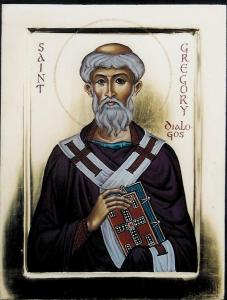 Those that are at variance are to be admonished to know most certainly that, in whatever virtues they may abound, they can by no means become spiritual if they neglect becoming united to their neighbours by concord.
Those that are at variance are to be admonished to know most certainly that, in whatever virtues they may abound, they can by no means become spiritual if they neglect becoming united to their neighbours by concord.
For it is written, But the fruit of the Spirit is love, joy, peace (Gal. 5:22). He then that has no care to keep peace refuses to bear the fruit of the Spirit.
Hence Paul says, Whereas there is among you envying and strife, are ye not carnal (1 Cor. 3:3)? Hence again he says also, Follow peace with all men and holiness, without which no man shall see the Lord (Heb. 12:14).
Hence again he admonishes, saying, Endeavouring to keep the unity of the Spirit in the bond of peace: there is one body and one Spirit, even as ye are called in one hope of your calling (Eph. 4:3-4). The one hope of our calling, therefore, is never reached, if we run not to it with a mind at one with our neighbours.
But it is often the case that some, by being proud of some gifts that they especially partake of, lose the greater gift of concord; as it may be if one who subdues the flesh more than others by bridling of his appetite should scorn to be in concord with those whom he surpasses in abstinence.
But whoso separates abstinence from concord, let him consider the admonition of the Psalmist, Praise him with timbrel and chorus (Ps. 150:4). For in the timbrel a dry and beaten skin resounds, but in the chorus voices are associated in concord. Whosoever then afflicts his body, but forsakes concord, praises God indeed with timbrel, but praises Him not with chorus.
Often, however, when superior knowledge lifts up some, it disjoins them from the society of other men; and it is as though the more wise they are, the less wise are they as to the virtue of concord.
[…] To such it is rightly said through James, But if ye have bitter envying and strife in your hearts, glory not, and lie not against the truth. This wisdom descendeth not from above, but is earthly, sensual, devilish. But the wisdom that is from above is first pure, then peaceable (James 3:14, 15, 17). Pure, that is to say, because its ideas are chaste; and also peaceable, because it in no wise through elation disjoins itself from the society of neighbours.
Gregory the Great (c.540-604): Pastoral Rule, 3, 22.
 Only the Holy Spirit can purify the intellect, for unless a greater power comes and overthrows the despoiler, what he has taken captive will never be set free (cf Luke 11:21-22).
Only the Holy Spirit can purify the intellect, for unless a greater power comes and overthrows the despoiler, what he has taken captive will never be set free (cf Luke 11:21-22).














